Microsoft Surface - light & fast to powerhouse performance
Over the past few years, Microsoft have stepped up their game in terms of not just making great software like Windows 10 & Microsoft Office... they decided to create hardware also
Microsoft first introduced the Surface device back in 2012 with the original Surface. Since then, Microsoft have launched over 12 successors to the original design with each one getting better either through design or performance.
For the purposes of this article, I am going to be discussing the current Surface range but will be doing a future post on the entire Surface family history from 2012 to the present day....coming soon!
There are currently 5 Surface devices that are available. These are:
- Microsoft Surface Pro
- Microsoft Surface Book 2
- Microsoft Surface Studio
- Microsoft Surface Laptop
- Microsoft Surface Hub
Now, of course, I will take you through each one along with a picture (just in case you've never heard of or seen a Surface device)...lets start with the Surface Pro
Surface Pro (2017)
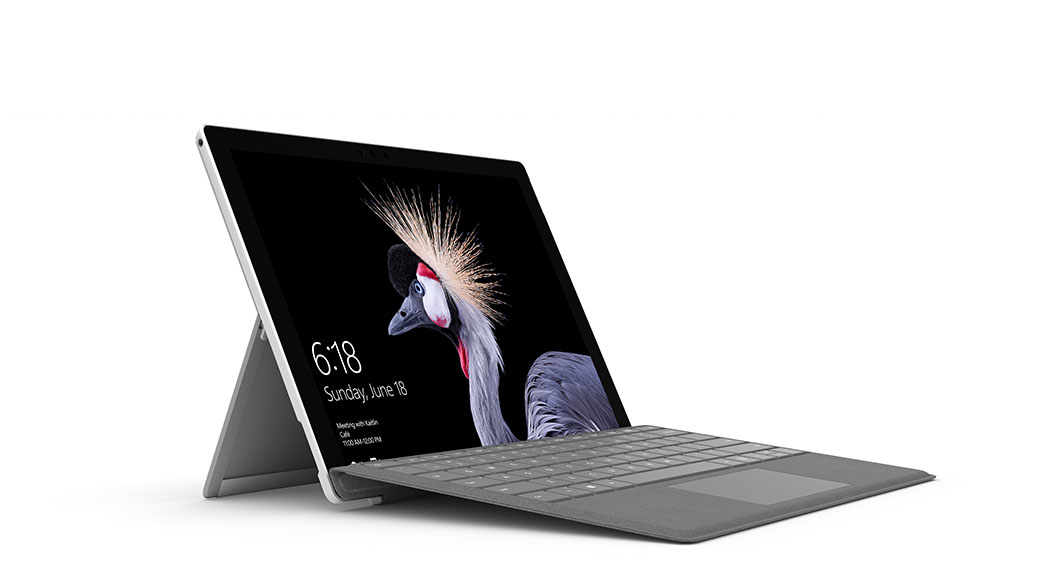
The new Surface Pro is the fifth generation of the Surface line up. The Surface Pro was released on the 15th June 2017 and features the new Kaby Lake Intel processors providing a significant speed boost compared to its predecessor, Surface Pro 4
Coming with Windows 10 Pro, the Surface Pro is mainly aimed at consumers who want a light and portable 2 in 1 with the performance of a laptop as well business customers who would need portable power when travelling or in the office environment.
Retailing at around £749 for the base model and going up to as much as £2,549, the Surface Pro comes with a range of specifications including up to 1TB of SSD (Solid State Drive) storage and as much as 16GB DDR5 RAM. The Surface Pro is a very light tablet compared to most laptops in the same category, weighing a mere 749 grams.
Microsoft Surface Book 2
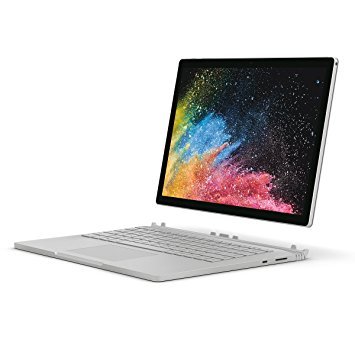
The Microsoft Surface Book 2 is the next generation Surface Book riding on a wave of success from the original Surface Book released back in October 2015. The new Surface Book 2, by comparison to the original Surface Book, has noticeable upgrades to earn it the title Most powerful Surface Book ever. It earns this title because it's powered by the latest quad-core 7th & 8th gen Intel processors.
The 13.5" Surface Book will feature Intel's 7th generation i5 processors with clock speed up to 3.5Ghz while the 15" version will feature Intel's 8th generation i7 processor which will clock up to 4.5Ghz processor speed.
The Surface Book 2 will also boast an impressive 17 hour battery life & feature up to 1TB Solid State Drive and 16GB RAM configurations. Prices for the Surface Book 2 start at around £1,449 (i5 processor, 8GB RAM and 256GB SSD hard drive) all the way up to £3,149 (i7 processor, 16GB RAM and 1TB SSD hard drive).
Microsoft Surface Studio
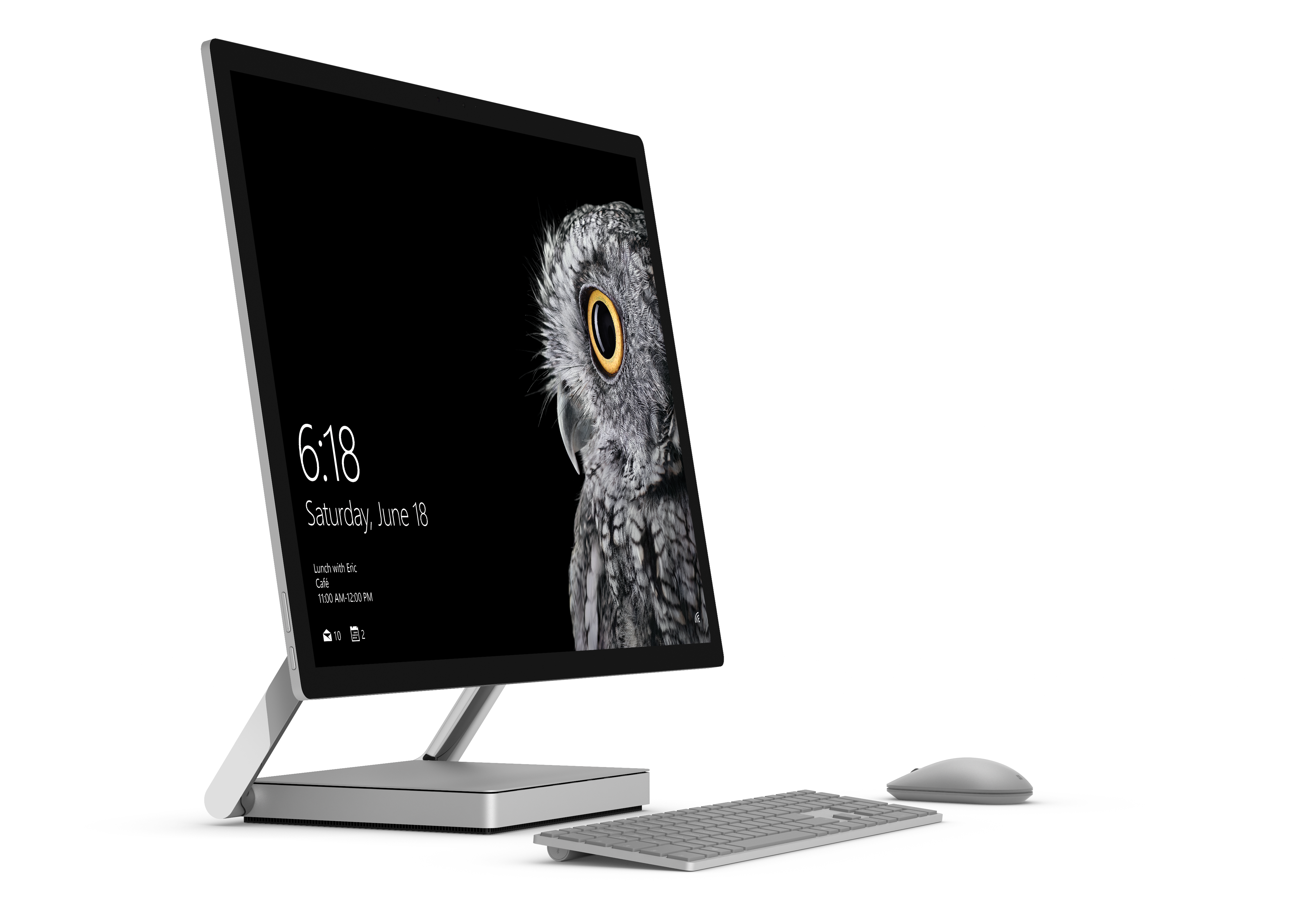
Microsoft Surface Studio is the ultimate creativity studio. Featuring an impressive 28" screen, it provides a canvas for any artist or creative person to really unleash their creativity & show their best work. The best thing with the Surface Studio is you can draw, design or annotate in the upright position & then lay it flat to draw and design mimicking a drafting table.
Microsoft Surface Studio features the 6th gen Intel processors allowing demanding applications such as SOLIDWORKS or Adobe Photoshop to run with ease. On top of the great speed, the Surface Studio features a discrete NVidia GeForce graphics card delivering stunning images and crisp, clean colours.
The Surface Studio is designed to look elegant but pack a punch. Designed with a unique counterbalanced hinge to allow easy transition from desktop mode to studio mode and an incredibly small footprint. The Surface Studio is designed to deliver crisp lines in a minimalist modern design.
Surface Studio prices range from £2,999 for the Intel i5/8GB RAM & 1TB SSD, up to £4,249 which features a massive 32GB RAM as well as the i7 processor and 2TB SSD drive, for serious performance. Great when working with design software such as AutoCAD so designs render and display beautifully with no delay.
Microsoft Surface Laptop
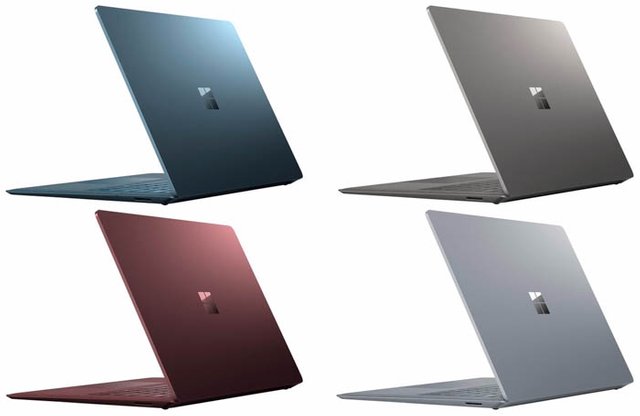
The Microsoft Surface Laptop is a new addition to the Surface family as it doesn't detach unlike the Surface Book & Pro. Surface Laptop was released in 2017 at the Microsoft EDU conference designed for teachers, students & educational bodies. Unveiled alongside the Surface Laptop was it's brand new version of Windows 10, named Windows 10 S.
Surface Laptop is designed and aimed for students. By running Windows 10 S, the Surface Laptop consistently performs, giving the user the same experience on day 1000 as on day 1. Microsoft Surface Laptop features the best of Windows 10 & Office, keeping the device secure, safe & sleek. Combine that with Microsoft Office & OneDrive, Microsoft's premium cloud storage service and you've got the ultimate laptop.
Here's what The Verge had to say:
"Microsoft's new Surface Laptop is the best laptop for most people because it blends power, portability, and battery life better than any other computer." - Dan Seifert, The Verge.
Surface Laptop comes in 4 two-tone colours - burgundy, platinum, cobalt blue & graphite gold. Combine these with the new range of Microsoft accessories designed exclusively to work with Surface and you've got your ultimate workstation all matching up, colour co-ordinated and looking the part.
Surface Laptop prices range from £949 (Platinum featuring Intel i5 processor, 4GB RAM & 128GB SSD) all the way up to £2,149 (Graphite Gold, Cobalt Blue & Burgundy featuring Intel i7 processor with 8GB or 16GB RAM and either a 256GB or 512GB SSD drive).
Microsoft Surface Hub
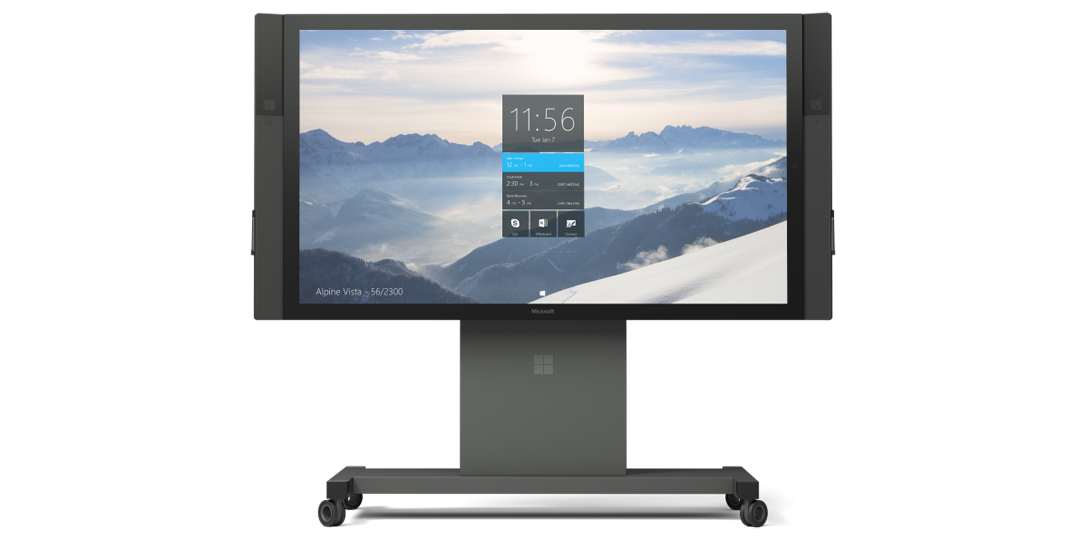
The Microsoft Surface Hub is designed for collaboration, conferencing and meetings enriched in up to 84" of 4K beauty. Connecting individuals regardless of their location to digital conferencing, whiteboard apps & more.
Released in June 2015, the Surface Hub is the ideal collaboration tool for the modern office. Surface Hub turns everyday meetings & conferences into an interactive brain storming session featuring an 84" 4K whiteboard to really let ideas come to life.
Featuring apps such as Skype for Business, Surface Hub connects all your colleagues together in real-time allowing them to participate in the meeting or conference as if they were really there. Easily send content, briefing notes, business communications and more effortlessly through Skype for Business.
The Surface Hub comes in two different screen sizes....55" and 84". These sizes are perfect for running the numerous compatible apps featured on the Surface Hub including Microsoft Office apps Word, Excel & PowerPoint, Microsoft Edge and Skype for Business.
Surface Hub prices range depending on which screen size you choose. The 55" version retails to business around £8,857 featuring a 4th gen Intel i5 processor, 8GB RAM & 128GB SSD along with 1GB ethernet port, 1 USB 3.0 and 2 USB 2.0 ports. The 84" inch version has a retail value of £21,842 featuring 4th gen Intel i7 processor, 8GB RAM and 128GB SSD along with 4 USB 2.0, 1 USB 3.0 and a NVidia Quadro K2200 graphics card.
Well, there we go. That's my article finished about Microsoft's Surface family. I really hope this helps educate people on the Surface family and how they can help you become a better creator, designer, inventor, gamer or just about anything.
Images courtesy of Microsoft (www.microsoft.com/en-gb).
More articles coming soon...
MrScottJ
While I appreciate the research you put into this article and I upvoted it for your work, I don't agree Microsoft is heading in a great direction, and I especially think Windows 10, apart from DirectX 12 (which they decided not to make compatible with W7...) is a huge step down from Windows 7 and it just completely shits on your privacy, even if you change all of the privacy options. Not to mention it was a bug-infested piece of crap at launch.
Also, intentionally, most new laptops and computers are not compatible with Windows 7, forcing you to use 10. You can get 7 working on some of them, but the average user has no chance of doing it.
I disagree with your opinion that Microsoft are not heading in a great direction. If you look beyond the norm of Windows 10, Office and Surface....you would see that there are numerous projects Microsoft are working on or collaborating with that will definitely benefit the world in the years to come. One example is that they have invented a wristwatch that will allow people with Parkinsons Disease to write without having to battle with their tremors. Do you not think that's a great step forward?
With regards to your opinion of Windows 10, I think referring to it as "a bug infested piece of crap at launch" is said without merit. As with anything new whether it be a new system, new product or service you are going to experience technical problems in the first few months or year. That is how things are tested, on real people and in the real world because you will get a totally different outcome compared to testing it in a virtual environment because that is controllable. Real life isn't.
Windows 10 is a very sophisticated operating system combining Windows 7's great features & Windows 8's modern app interface. Most laptops these days are far superior compared to laptops that were out when Windows 7 was around about 5 years ago. Things change, technology moves on and we have to adapt to it and embrace change not resist it. There are many great features in Windows 10 that make it a great operating system....
Let me ask you an honest question. Have you used Windows 10 and all its features to the full extent? I would imagine not as you've come up against some error messages or blue screens and instantly made the assumption that, compared to Windows 7, it isn't a great operating system.
Microsoft are not forcing you to use any operating system in favour of another. It is the way technology is moving forward that people upgrade. People demand more from their technology these days and because people are leading more hectic lives where time is important to fit everything in, it is more about convenience and time saving than being "forced" to upgrade and use new operating systems or technologies.
Thank you for replying with your opinion though.
MrScottJ
I have used Windows 10 and it's currently installed on my laptop (I also have a PC). I'm actually quite tech-savvy. I didn't make assumptions, I compared my experience with both of them. For example, Windows 7 never tried to access my webcam without permission or reason, but on the first day of installing Windows 10, after changing all of their privacy-invading settings from default to custom options, Windows 10 tried to use my webcam for no reason and without telling me. My Antivirus (the same one I had on 7, Kaspersky) warned me about this and I declined. Also, there's a reason Windows 10 Home Edition has 2.5 stars on the Microsoft website. So much for ease of use.
If you research the subject a bit, you will probably also realize that Intel + Microsoft made it on purpose that the new laptops and PCs are incompatible with 7 by not putting out any Kaby Lake USB drivers for Windows 7. You install Windows 7 (through USB,nonetheless) and after installation all USB ports stop working. You can actually extract the driver files from the W10 driver executable file and install them manually from Device Manager and they work perfectly fine, but the executable file will refuse to work. Why else would they do this if not to push you to W10? According to statistics from August 2017, 48.43% of people still used Windows 7, and only 27.99% used 10, but they're acting like nobody uses 7 anymore, just like with the DirectX 12 bullshit they pulled by not making it compatible with W7.